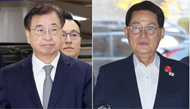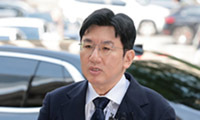▶ Pakistan shrugs and says little about its doomsday machines.

Potential vulnerabilities in Pakistan’s nuclear infrastructure have become a growing sore point between Washington and Islamabad. Pakistani soldiers monitor the Afghan border.
As the insurgency grows in Pakistan, concerns mount over the security of the country’s nuclear arsenal.
By DAVID E. SANGER - WASHINGTON
AS THE INSURGENCY of the Taliban and Al Qaeda spreads in Pakistan, senior American officials say they are increasingly concerned about new vulnerabilities for Pakistan’s nuclear arsenal, including the potential for militants to snatch a weapon in transport or to insert sympathizers into laboratories or fuel-production facilities.
The officials emphasized that there was no reason to believe that the arsenal, most of which is south of the capital, Islamabad, faced an imminent threat. President Barack Obama said recently that he remained confident that keeping the country’s nuclear infrastructure secure was the top priority of Pakistan’s armed forces.
But the United States does not know where all of Pakistan’s nuclear sites are located, and its concerns have intensified recently since the Taliban entered Buner, a district about 100 kilometers from the capital. The spread of the insurgency has left American officials less willing to accept assurances from Pakistan that the weapons are safe.
Pakistani officials have continued to avoid American requests for more details about the location and security of the country’s nuclear sites, the officials said.
Some of the Pakistani reluctance, they said, stemmed from longstanding concern that the United States might be tempted to seize or destroy Pakistan’s arsenal if the insurgency appeared about to engulf areas near Pakistan’s nuclear sites. But they said the most senior American and Pakistani officials had not yet engaged on the issue, a situation that may have changed during President Asif Ali Zardari’s visit last week with Mr. Obama in Washington.
“We are largely relying on assurances, the same assurances we have been hearing for years,”said one senior official who was involved in the dialogue with Pakistan during the Bush years, and remains involved today.“The worse things get, the more strongly they hew to the line,‘Don’t worry, we’ve got it under control.’”
In public, the administration has only hinted at those concerns, repeating the formulation that the Bush administration used: that it has faith in the Pakistani Army.
“I’m confident that we can make sure that Pakistan’s nuclear arsenal is secure,”Mr. Obama said April 29,“primarily, initially, because the Pakistani Army, I think, recognizes the hazards of those weapons falling into the wrong hands.”He added:“We’ve got strong military-to-military consultation and cooperation.”
But that cooperation, according to officials who would not speak for attribution because of the sensitivity surrounding the exchanges between Washington and Islamabad, has been sharply limited when the subject has turned to the vulnerabilities in the Pakistani nuclear infrastructure. The Obama administration inherited from President Bush a multiyear, $100 million secret American program to help Pakistan build stronger physical protections around some of those facilities, and to train Pakistanis in nuclear security.
But much of that effort has now petered out, and American officials have never been permitted to see how much of the money was spent, the facilities where the weapons are kept or even a tally of how many Pakistan has produced.
The facility Pakistan was supposed to build to conduct its own training exercises is running years behind schedule.
Mr. Zardari heads the country’s National Command Authority, the mix of political, military and intelligence leaders responsible for its arsenal of 60 to 100 nuclear weapons. But in reality, his command and control over the weapons are considered tenuous at best; that power lies primarily in the hands of the army chief of staff, General Ashfaq Parvez Kayani, the former director of Inter-Services Intelligence, the country’s intelligence agency.
For years the Pakistanis have waved away the recurring American concerns, with the head of nuclear security for the country, General Khalid Kidwai, dismissing them as“overblown rhetoric.”
Americans who are experts on the Pakistani system worry about what they do not know.“For years I was concerned about the weapons materials in Pakistan, the materials in the laboratories,”said Rolf Mowatt-Larssen, who ran the Energy Department’s intelligence unit until January, and before that was a senior C.I.A. officer sent to Pakistan to determine whether nuclear technology had been passed to Osama bin Laden.
“I’m still worried about that, but with what we’re seeing, I’m growing more concerned about something going missing in transport,” said Mr. Mowatt-Larssen, who is now at Harvard’s Kennedy School of Government in Cambridge, Massachusetts. Several current officials said that they were worried that insurgents could try to provoke an incident that would prompt Pakistan to move the weapons, and perhaps use an insider with knowledge of the transportation schedule to tip them off.
The Pakistanis, not surprisingly, dismiss those fears as American and Indian paranoia, intended to dissuade them from nuclear modernization. But the government’s credibility is still hurt by the fact that it used equal vehemence to denounce as fabrications the reports that Abdul Qadeer Khan, one of the architects of Pakistan’s race for the nuclear bomb, had sold nuclear technology on the black market.
In the end, those reports turned out to be true.
스마터리빙
more [ 건강]
[ 건강]이제 혈관 건강도 챙기자!
[현대해운]우리 눈에 보이지 않기 때문에 혈관 건강을 챙기는 것은 결코 쉽지 않은데요. 여러분은 혈관 건강을 유지하기 위해 어떤 노력을 하시나요?
 [ 건강]
[ 건강]내 몸이 건강해지는 과일궁합
 [ 라이프]
[ 라이프]벌레야 물럿거라! 천연 해충제 만들기
 [ 건강]
[ 건강]혈압 낮추는데 좋은 식품
[현대해운]혈관 건강은 주로 노화가 진행되면서 지켜야 할 문제라고 인식되어 왔습니다. 최근 생활 패턴과 식생활의 변화로 혈관의 노화 진행이 빨라지고
사람·사람들
more많이 본 기사
- “메디케이드 받은 불체자 색출하라”
- 안선영, 캐나다 거주 중 안타까운 비보 “장례식 못 가..한참 심호흡”
- 가주 전역 일제히 특별선거… ‘발의안 50’ 통과 전망
- “거두절미하고 죄송”.. ‘엄태웅 아내’ 윤혜진, 거듭 사과한 이유는?
- ‘커버드 CA’ 등록 시작… 보험료 급등 우려
- 체니 전 부통령 별세
- 즉석 파스타 ‘리스테리아’ 파문… 6명 식중독 사망
- 한혜진 “♥기성용 잘생겨서 싸워도 덜 화나” 솔직 고백
- 역대 최초 무슬림 뉴욕시장 탄생… 맘다니 과반 압승
- 제2의 IS 테러 날뻔… “핼로윈 총기난사”
- “메디케어 파트 D 점검·가입 도와드려요”
- 평통위원들 ‘회비 미납’ 심각
- 51년 만에 문 닫았다
- 한인타운에 초대형 손흥민 벽화
- 한국 ‘전통공예 장인들의 숨결’
- 페어옥스 영화관·UVA서 ‘총기난사 협박’사건 발생
- “차 문 안 열려 사망”… 테슬라 상대 소송
- 메디케이드 받는 불체자 색출한다
- 추수감사절 앞두고 ‘터키 쇼크’…도매가 75% 급등
- PG 카운티서 현금 수송차량 강도 당해
- 2025 총선, VA 선택은…트럼프 찬반이 표심 갈라
- 한미 의료협력 새로운 장 열다
- VA·MD 친선탁구대회 21개팀 출전
- 한인 이민사 음악영화 ‘하와이 연가’ DC서 무료 상영
- 김설향 명예교수 ‘저속노화의 명약’ 특강
- 카르텔 폭력 심화에 성난 멕시코 주민들
- 트럼프 와이너리 4
- 김준호→이상민 재혼했는데.. ‘돌싱’ 탁재훈, 여전히 솔로? “만나는 사람 없나 봐” 발언에 당황
- 맘다니 “이 도시는 여러분의 것” 일성⋯ 트럼프 강한 견제
- 아시아나, 인천공항 제2터미널로 이전
- ‘북 원로’ 김영남 사망 외교 고위직, 향년 97세
- 한인은행 부실대출 3억달러 육박… 전년비 34%↑
- 또 총영사관 사칭 보이스피싱… 지속 발생
- ‘인도계무슬림 뉴욕시장’ 역사 쓴 맘다니…짧은 이력서엔 의구심
- 경찰, ‘1천900억 부당이득 혐의’ 방시혁 3차 소환…추가조사
- ‘서해피격’ 서훈 징역 4년·박지원 2년 구형…내달 26일 선고
- 트럼프, 멕시코 마약 카르텔 겨냥 미군 투입 검토
- 오픈AI, 1조달러 가치 기업공개 추진
- ‘우승 합작’ 오타니는 MVP 후보… 야마모토는 사이영상 후보
- 웨이모 로보택시, 서비스 지역 확대
- 트럼프는 중국의 규칙을 따른다
- UC 교내 서류미비 학생 고용 금지는 ‘차별’
- 스타벅스, ‘레드컵 데이’ 13일 개최
- 줌으로 하는 ‘명상과 북클럽’ 모임
- 뉴욕시·버지니아·뉴저지주 선거 민주 싹쓸이…트럼프에 견제구
- “날아다니는 상업용 자동차 연내 공개”
- 연방정부, 11월 푸드스탬프 일부 지급한다
- 김건희 “두차례 샤넬백 받아” 첫인정…尹직무관련·대가성 부인
- 피해 금액 얼마길래..성시경, 결혼식까지 챙긴 매니저 배신에 참담
- 권일연 회장(H 마트 창립자),‘아시안 명예의 전당’헌액
1/5지식톡

-
 테슬라 자동차 시트커버 장착
0
테슬라 자동차 시트커버 장착
0테슬라 시트커버, 사놓고 아직 못 씌우셨죠?장착이 생각보다 쉽지 않습니다.20년 경력 전문가에게 맡기세요 — 깔끔하고 딱 맞게 장착해드립니다!장착비용:앞좌석: $40뒷좌석: $60앞·뒷좌석 …
-
 식당용 부탄가스
0
식당용 부탄가스
0식당용 부탄가스 홀세일 합니다 로스앤젤레스 다운타운 픽업 가능 안녕 하세요?강아지 & 고양이 모든 애완동물 / 반려동물 식품 & 모든 애완동물/반려동물 관련 제품들 전문적으로 홀세일/취급하는 회사 입니다 100% …
-
 ACSL 국제 컴퓨터 과학 대회, …
0
ACSL 국제 컴퓨터 과학 대회, …
0웹사이트 : www.eduspot.co.kr 카카오톡 상담하기 : https://pf.kakao.com/_BEQWxb블로그 : https://blog.naver.com/eduspotmain안녕하세요, 에듀스팟입니다…
-
 바디프렌드 안마의자 창고 리퍼브 세…
0
바디프렌드 안마의자 창고 리퍼브 세…
0거의 새제품급 리퍼브 안마의자 대방출 한다고 합니다!8월 23일(토)…24일(일) 단 이틀!특가 판매가Famille: $500 ~ $1,000Falcon: $1,500 ~ $2,500픽업 & 배송직접 픽업 가능LA…
-
 바디프렌드 안마의자 창고 리퍼브 세…
0
바디프렌드 안마의자 창고 리퍼브 세…
0거의 새제품급 리퍼브 안마의자 대방출 한다고 합니다!8월 23일(토)…24일(일) 단 이틀!특가 판매가Famille: $500 ~ $1,000Falcon: $1,500 ~ $2,500픽업 & 배송직접 픽업 가능LA…
케이타운 1번가
오피니언
 정숙희 논설위원
정숙희 논설위원트럼프 와이너리
 파리드 자카리아 워싱턴포스트 칼럼니스트 / CNN ‘GPS’ 호스트
파리드 자카리아 워싱턴포스트 칼럼니스트 / CNN ‘GPS’ 호스트 트럼프는 중국의 규칙을 따른다
 김동찬 시민참여센터 대표
김동찬 시민참여센터 대표 [미국은 지금] 복합적 위기 어떻게 대처해야 하나
 이현숙 수필문학가협회 이사장
이현숙 수필문학가협회 이사장 [수요 에세이] 연필 한 자루, 그리고 스타인벡
 한영일 / 서울경제 논설위원
한영일 / 서울경제 논설위원[만화경] 중국 규제 혁파의 메카 ‘선전’
 문태기 OC지국장
문태기 OC지국장 GG 코리아타운 한인 시니어 ‘보금자리’
 민경훈 논설위원
민경훈 논설위원우리가 감사하며 살아가야 할 생명체
 박홍용 경제부 차장
박홍용 경제부 차장 AI 혁명의 명암, 샌앤젤레스가 던지는 경고
 정유환 수필가
정유환 수필가 [화요칼럼] 캘리에서 온 가을
1/3지사별 뉴스

역대 최초 무슬림 뉴욕시장 탄생… 맘다니 과반 압승
초미의 관심을 모았던 뉴욕시장 본선거에서 조란 맘다니 민주당 후보가 승리하면서 역대 최초의 무슬림 뉴욕시장이 탄생했다. 초박빙 판세로 여겨졌던…
메디케이드 받는 불체자 색출한다

“메디케어 파트 D 점검·가입 도와드려요”
워싱턴 한인복지센터(이사장 김진아)가 지난달 15일 시작된 메디케어 파트 D 연례 점검 및 가입 서비스를 제공하고 있다. 메디케어 파트 D(…
한국 ‘전통공예 장인들의 숨결’

‘30대 진보’ 맘다니 뉴욕시장 당선…최대도시 첫 무슬림 시장
30대 진보 정치인이자 인도계 무슬림인 조란 맘다니(34) 뉴욕주 의원이 4일 뉴욕시장으로 당선됐다. 무슬림이 미국 최대 도시인 뉴욕의 시장으…
“총영사관 등 사칭 보이스피싱 주의 하세요”

오늘 하루 이 창 열지 않음 닫기 





















































.png)


댓글 안에 당신의 성숙함도 담아 주세요.
'오늘의 한마디'는 기사에 대하여 자신의 생각을 말하고 남의 생각을 들으며 서로 다양한 의견을 나누는 공간입니다. 그러나 간혹 불건전한 내용을 올리시는 분들이 계셔서 건전한 인터넷문화 정착을 위해 아래와 같은 운영원칙을 적용합니다.
자체 모니터링을 통해 아래에 해당하는 내용이 포함된 댓글이 발견되면 예고없이 삭제 조치를 하겠습니다.
불건전한 댓글을 올리거나, 이름에 비속어 및 상대방의 불쾌감을 주는 단어를 사용, 유명인 또는 특정 일반인을 사칭하는 경우 이용에 대한 차단 제재를 받을 수 있습니다. 차단될 경우, 일주일간 댓글을 달수 없게 됩니다.
명예훼손, 개인정보 유출, 욕설 등 법률에 위반되는 댓글은 관계 법령에 의거 민형사상 처벌을 받을 수 있으니 이용에 주의를 부탁드립니다.
Close
x